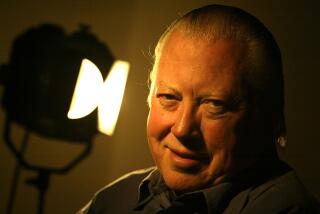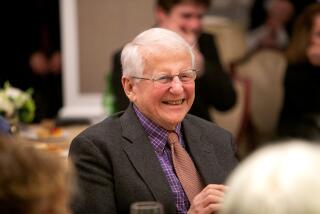Joel Rogosin, ‘Knight Rider’ and ‘Magnum, P.I.’ producer, dies of COVID-19 complications
Joel Rogosin, an Emmy-nominated TV producer, knew that making it in Hollywood sometimes took more than talent. It took hustle, and sometimes it helped to know somebody.
“It only took one person to help you break in, to get you inside,” Rogosin wrote in a 2004 memoir. “Then if you were ambitious and lucky and didn’t screw up, there were opportunities.”
Rogosin, whose producing credits include the 1980s crime-fighting TV staples “Knight Rider” and “Magnum, P.I.,” died of complications from COVID-19 on April 21. He was 87.
Rogosin was born in Boston on Oct. 30, 1932, grew up in Virginia and graduated from Stanford University in 1955, where he met one of those Hollywood somebodies: a classmate who also happened to be the daughter of Metro-Goldwyn-Mayer studio president Dore Schary.
The MGM head invited the awestruck Rogosin to visit the studio lot, where he recalled passing “two outer offices, each larger with a prettier secretary, which took me to Mr. Schary’s inner outer office, where I almost bumped into a startlingly beautiful Elizabeth Taylor.” Inside Schary’s office, he saw the studio head “counting what appeared from a distance to be, and in fact was, a pile of money!”
That was Hollywood.
So was the job Rogosin actually landed when the Schary meeting was a dud: messenger at Columbia Pictures, a totally different studio. The starting-from-rock-bottom strivers who worked alongside him in the mail room all had bachelor’s or post-secondary degrees. They delivered mail, trade papers, packages, scripts and cartons of cigarettes to the executives whose favor they craved but whose power intimidated them.
But Rogosin was inside, and that’s what counted. He floated up to the Warner Bros. story department and became an associate producer on “77 Sunset Strip,” a hit ABC detective show that marked the start of Rogosin’s three-decade TV producing career.
“They didn’t call them showrunners back then, but back in the days of three networks and nothing else, they were the backbone of the TV industry,” Bob Beitcher, president and chief executive of the Motion Picture and Television Fund, wrote in a tribute to Rogosin.
One of Rogosin’s longest-running producing stints came on the classic TV western “The Virginian,” where he also made his directing debut in 1968. In one episode, he agreed to cast dozens of Native American extras at the demand of musician and guest star Buffy Sainte-Marie, who is Cree. At the time, The Times called it “an unheard-of request” in Hollywood, where such parts were typically played by non-Native actors.
“He was attracted to inclusion in a broad sense,” said Robin Rogosin, one of his three daughters, who noted that several of Rogosin’s projects featured characters with disabilities, including “Ironside,” which starred a retired detective who used a wheelchair. “He was progressive. He wore a medallion that said ‘War is not healthy for children and other living things’ for probably 50 years.”
While producing “Longstreet,” an early-1970s ABC crime show about a blind investigator, Rogosin worked with the martial artist Bruce Lee, who had not yet hit the heights of stardom.
“Bruce used to hide behind my open office door, and when I came in he’d grab me from behind in a grip of steel, pinning my arms and immobilizing me while he demanded that I beef up his part in next week’s episode,” Rogosin said in his memoir.
Rogosin helped the multitalented, velvet-voiced jazz crooner Mel Torme try his hand at acting and screenwriting, and he also produced Jerry Lewis telethons to raise funds to fight muscular dystrophy.
At a panel in 1982, while he was supervising producer on “Magnum, P.I.,” Rogosin complained that it was difficult to get approval to hire actors with disabilities. “The policies come from the networks,” Rogosin said. “I was told to get lost when I asked about bringing more disabled into the industry.”
Late in his career, Rogosin also helped stage original musicals that he created alongside his brother Roy, a musician and composer who founded New Hampshire’s Portsmouth Academy of Performing Arts.
In the early 1990s, Joel Rogosin gave a metafictional spin on “A Christmas Carol” with “A Carol of Christmas,” which featured factory workers reenacting the old Dickens classic for a company play.
Rogosin enjoyed the creative autonomy he got from working on a small theater production with Roy and lyricist Bruce Belland, especially compared with the mainstream TV productions he had long been involved in.
“In L.A., they have all these committees,” Joel Rogosin told The Times in 1990. “Here, we’re the committee, the three of us.”
Rogosin also taught writing at colleges and in a program for prisoners, as well as at a Writers Guild of America diversity program and at the Performing Arts Theater for the Handicapped.
Rogosin died at the Motion Picture Television Fund’s retirement home in Woodland Hills, where at least six residents have succumbed in a COVID-19 outbreak. Last year Rogosin persuaded the fund to rename the campus’ long-term care facility to the Mary Pickford House, after the silent-film star who helped found the organization.
He is survived by his wife of more than 65 years, Deborah; three daughters; five grandchildren; and two great-grandchildren.
More to Read
Start your day right
Sign up for Essential California for the L.A. Times biggest news, features and recommendations in your inbox six days a week.
You may occasionally receive promotional content from the Los Angeles Times.







